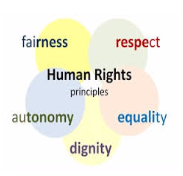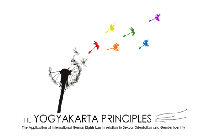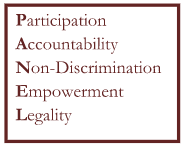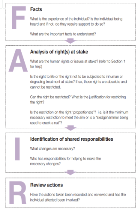

Human rights are rights inherent to all human beings, whatever our nationality, place of residence, sex, national or ethnic origin, colour, religion, language, or any other status. We are all equally entitled to our human rights without discrimination. These rights are all interrelated, interdependent and indivisible. The principles are: Universal and inalienable, Interdependent and indivisible, Equal and non-discriminatory, and Both Rights and Obligations.

In 2006, in response to well-documented patterns of abuse, a distinguished group of international human rights experts met in Yogyakarta, Indonesia to outline a set of international principles relating to sexual orientation and gender identity. The result was the Yogyakarta Principles: a universal guide to human rights which affirm binding international legal standards with which all States must comply. They promise a different future where all people born free and equal in dignity and rights can fulfil that precious birthright.

The UN Guiding Principles on Business and Human Rights are a set of guidelines for States and companies to prevent, address and remedy human rights abuses committed in business operations. They were proposed by UN Special Representative on business & human rights John Ruggie, and endorsed by the UN Human Rights Council in June 2011.

Taking a human rights based approach is about using international human rights standards to ensure that people’s human rights are put at the very centre of policies. A human rights based approach will empower people to know and claim their rights and increase the ability of organisations, public bodies and businesses to fulfil their human rights obligations. And creates solid accountability so people can seek remedies when their rights are violated. The PANEL principles are one way of breaking down what a human rights based approach means in practice. PANEL stands for Participation, Accountability, Non-Discrimination, Empowerment and Legality.

The Scottish Human Rights Commission has developed a human rights based approach called the ‘FAIR’ approach. The role of a human rights based approach is to ensure that the dignity of the individual is at the centre of policy and decision making. Where it is applied everyone affected will have an opportunity to help think through how human rights can best be realised in the delivery of care and support services. Presented as a flow chart, FAIR stands for Facts, Analyse rights, Identify responsibilities and Review actions. Not every unfair situation will be an abuse of human rights law. Often using the FAIR approach, however, can be a means of reaching a balanced and just solution in those situations.

The Paris Principles are a set of international standards which frame and guide the work of National Human Rights Institutions (NHRIs). Drafted at an international NHRIs workshop in Paris in 1991, they were adopted by the United Nations General Assembly in 1993 and have been in existence now for over 20 years. NHRIs must comply with the Principles which identify their human rights objectives and provide for their independence, broad human rights mandate, adequate funding, and an inclusive and transparent selection and appointment process. The Principles are broadly accepted as the test of an institution’s legitimacy and credibility.